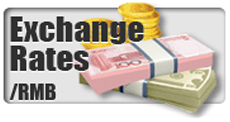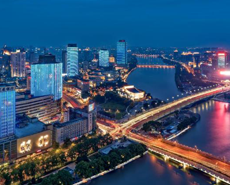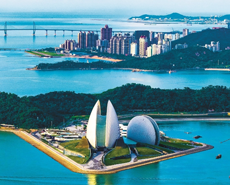
Demand for magnesium ingot in India to rise in 2021
----Interview with Sanjay Arya
General Manager
KR Metals
General Manager
KR Metals
KR Metal was established 2007 in Mumbai, India by Mr. Rajesh Gala and Sanjay Arya with purpose of trading in Metals and Ferro Alloys. With over 15 years' experience, the company represents some of the large metals and ferro alloys producers in India for their products. The customers include, among others, Arcelor Mittal, Nippon Steel, Hindalco Industries, Jindal Aluminium, Tata Steel Group company, Jindal Steel Group companies and Vedanta Limited etc. The trading volume reaches about 25 million US Dollars annually.
Asian Metal: Mr. Sanjay Arya, thanks for taking the interview by Asian Metal. Please introduce your business briefly.
Sanjay Arya: KR Metals is a trading company based in Mumbai, India. Me and my partner Mr. Rahesh Gala started this company in 2007. We both have over 25 years of experience in trade of metals and ferro alloys. Most of our business is back to back sales through our associate company in Hong Kong. We also do business on commission basis and stock and sale from our own warehouses in Mumbai. As for magnesium ingot, our regular monthly trading volume could reach about 500t and our clients’ demand stays stable on the whole.


Asian Metal: The unexpected COVID-19 struck the global magnesium market, how about the demand for magnesium ingot in Indian market in 2020 and what about your situation?
Sanjay Arya: 2020 was an unbelievable year for everyone in the world, lockdowns hit everybody professional and personal lives. Lockdowns resulted in drop in demand as factories reduced production. Actually, we suffered a very harsh period for magnesium ingot market from April to June as Indian locked down and majority plants stopped their production. Normally, the export volume for magnesium ingot from China to India could reach about 1,500t a month, while the average monthly export volume decreased to about 700t from April to June. As I mentioned, our monthly trading volume for magnesium ingot could reach about 500t, while just about 100t a month during that period. What’s worse, the logistics almost stopped and we suffered heavy pressure on it.
Asian Metal: After Chinese Spring Festival holiday in 2021, prevailing import magnesium ingot prices increased by about USD200/t and now hover at USD2,480-2,500/t CIF NS, what about reactions from your clients?
Sanjay Arya: Mainstream prices for import magnesium ingot went up by USD200/t in late February to USD2,500/t CIF NS, which was beyond my clients’ acceptance and most of them kept watching the market in late February. They only began to purchase the material from early March from hand to mouth due to high prices and fiscal month in March. For example, one of my regular clients purchased the material 60t a month, while he reduced the volume to 30t and separated to two times within a month. Actually, the stocks for magnesium ingot in India stayed at a low level, while my clients still held cautious attitudes towards the trend.


Asian Metal: How do you think about the price trend in Q2?
Sanjay Arya: We believe that Q2 price will keep showing an increasing trend as it belongs to a peak season for market. Taking rising coal, ferrosilicon prices, smooth buying activities, tight spot goods from plants and rising aluminum prices into consideration, I forecast mainstream import magnesium ingot prices would increase to about USD2,800-3,000/t CIF NS in Q2. Most buyers in Indian market would place orders as scheduled.
Asian Metal: Entering 2021, does the demand in Indian market pick up and how about your anticipation for the whole picture in 2021 against 2020?
Sanjay Arya: Indian demand is picking up and we expected it to grow this year. As more industries return to normal production states. Government of India pushing to increase country’s GDP will help raise demand for light metals. Given these situations, I have strong confidence in the market demand and rising trading volume for us. What’s more, I believe the export volume from China to India would achieve about 1,500t as a previous level. Everything in 2021 will become better than that of 2020.
Asian Metal: As I know, India is the fourth largest import country for magnesium ingot, what are the main consumers for magnesium ingot in Indian market? Among which, your volume also stays at a high and stable level, what about your business distribution?
Sanjay Arya: Main consumers for magnesium ingot in India are from downstream aluminum industry-primary (billets), secondary (extrusion and alloy makers) and fusing makers, followed by granules makes. Our business is evenly distributed as per industry size and main consuming industry ranking, mainly buyers include primary producers and then secondary buyers and so on. Supposed by a normal production state from my regular clients, our trading volume would return back to about 400-500t a month.
Asian Metal: Besides 7.5kg magnesium ingot, Indian market also involves of large volume for 300g material. What about the main consumers for the product and how about the demand in coming 2021?
Sanjay Arya: Main buyers of 300g ingots are ductile pipe makers, these consumers use magnesium metal directly to produce ductile pipes by replacing consumption of fesimg alloy in their process. Encouraged by rising demand on the whole, I anticipate the demand for 300g magnesium ingot in 2021 would move up by about 30% compared with the consumption volume in 2020.
Asian Metal: What about the main payment way in Indian market?
Sanjay Arya: Since most of major consigners in India reimporting themselves, payment terms are through bank, which is-cash against documents. Recently this trend is changing, among bigger consumers/buyers, to direct credit terms from international suppliers are well. Indian industry is maturing and hence demanding flexible payment terms.

















